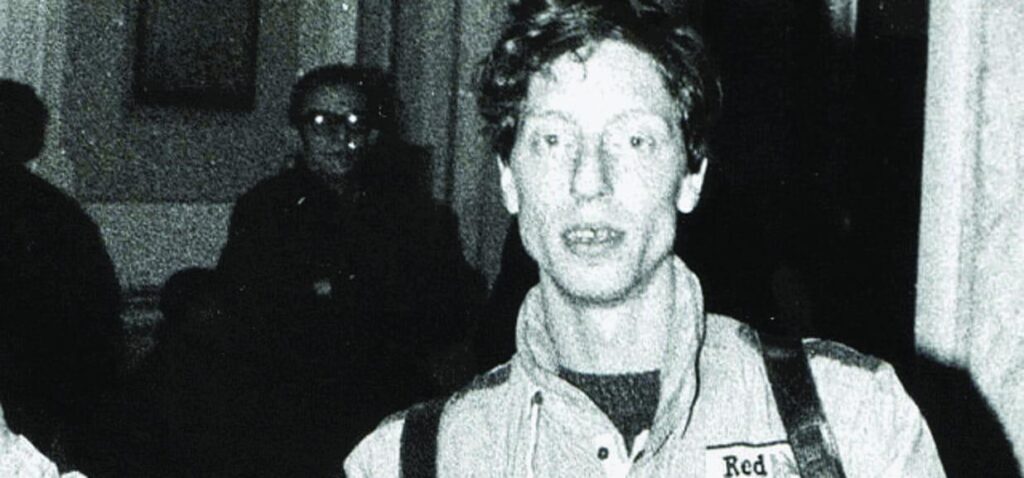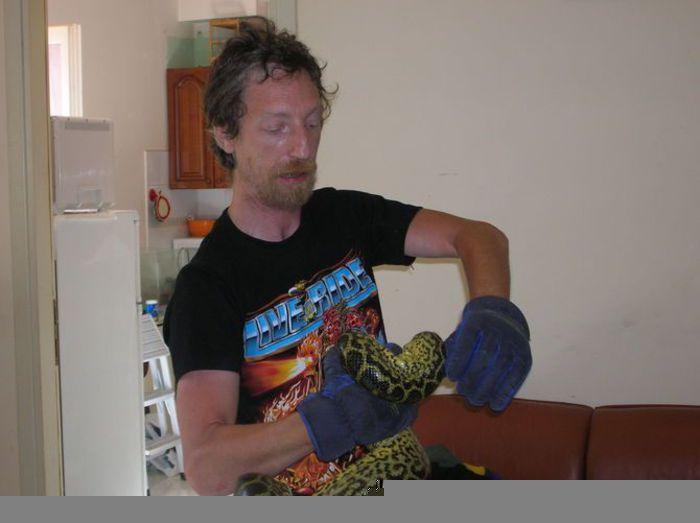Italian version. English version below.

Roberto Delle Fave non era solo un mercenario. Era un archivio vivente di tutte le colpe che l’Europa ha rimosso dopo Srebrenica. La sua storia (fatta di crimini, menzogne e un cancro invocato come espiazione) è la cartina al tornasole di un continente che tende a dimenticare.
«Conduco una vita sregolata, spero che mi venga un cancro che mi faccia pagare le pene di tutti quelli che ho ammazzato». Roberto Delle Fave morì davvero di tumore al cervello, nel 2014, ma la sua malattia era iniziata decenni prima, nei Balcani degli anni Novanta. Dove un ex teppista di Bordighera (già carcerato a 14 anni, già giornalista precario al Festival di Sanremo,come lo ricordò Toto Cutugno) si era reinventato prima come “Red Devil”, poi come Dio.
La sua non è la solita storia di un reduce affetto da disturbi da stress post-traumatico. È il racconto di come la guerra (e le leggende connesse ad essa) possano diventare una droga. E di come, una volta finita la guerra, chi ha combattuto rimane sospeso in un limbo di ricordi intollerabili e menzogne quasi necessarie.
LA TRASFIGURAZIONE
Delle Fave arrivò in Croazia nel 1991 come inviato. Ma quando una soldatessa croata morì per salvarlo, capì che l’osservazione non bastava più. «È diventata una vendetta», disse. Imbracciò il fucile e iniziò la sua metamorfosi: da cronista a combattente, da italiano a mercenario, da uomo a “diavolo”.
Il suo peccato originale (l’omicidio accidentale di un bambino a Vinkovci) lo descrisse con una precisione da perizia forense: «L’ho fatto ballare per tutta la durata dei 30 colpi del Kalashnikov». Poi la consapevolezza: «Ero una merda». Ma invece di fermarsi, accelerò.
In Bosnia, con i “Crni Labudovi” (i “Cigni Neri”, una unità paramilitare bosniaca), completò la trasformazione: «Non c’era nessuna regola militare, quindi facevi quel cazzo che volevi. Quello è essere dio». Essere dio, per lui, significava decidere chi viveva e chi moriva. Ma anche scopare «ragazzine di 5-7 anni come le 70enni». Il potere assoluto come antidoto ai problemi di un venticinquenne di Bordighera.
LA MACCHINA MITOMANE
Delle Fave non si limitò a combattere. Costruì un personaggio che fosse all’altezza dell’orrore che vedeva (e che contribuiva a creare). Si proclamò fondatore dei “Crni Labudovi”. Sostenne di conoscere Arkan,il tristemente famoso comandante paramilitare serbo e anche capo ultrà, che definì «il più grande, il più figo». Raccontò di traffici d’organi che collegavano i Balcani a Trieste, salvo poi ritrattare tutto quando finì sotto inchiesta: «Mi meraviglio che mi abbiano creduto», ammise.
Era un bugiardo patologico? Forse. Un narratore che capiva che, di fronte all’assurdo della guerra etnica, solo le storie più estreme potevano avvicinarsi alla verità? Plausibile. «Hitler era folle, io sono pazzo, è diverso», dichiarò in un’intervista. Una distinzione che suona come un tentativo di dare un ordine al caos che lo abitava. La follia è una condizione medica. La pazzia è una scelta filosofica.

IL RITORNO IMPOSSIBILE
Terminata la guerra, Delle Fave tornò a Bordighera. Si circondò di serpenti, piranha e altri animali esotici. Come se cercasse nella pericolosità controllata degli animali esotici un sostituto accettabile del fronte bosniaco.
Ma il fronte era dentro di lui. Nel 2010 la polizia trovò nella sua casa «bossoli calibro 7,62, ogive inesplose, pistole scacciacani e placche di riconoscimento false». Fu scarcerato quasi subito: doveva occuparsi dei suoi rettili. Una conclusione surreale per un reduce surreale.
Quando il cancro arrivò, nel 2014, fu l’epilogo di una profezia autoavverante. La punizione che aveva cercato attraverso sigarette, alcol e una vita «totalmente squilibrata». I suoi serpenti furono affidati ad altri. Le sue storie (quelle vere e quelle inventate) finirono in qualche documentario di nicchia, come quello del 2010 di Erion Kadilli, disponibile su internet archive (“Sono stato dio in Bosnia” Kadilli 2010).
IL FANTASMA DEI BALCANI

Cosa resta di Roberto Delle Fave? Un uomo che andò nei Balcani per darsi un’identità e tornò con troppe identità, nessuna delle quali sopportabile. Non solo la storia di un mercenario, ma il ritratto di un’Europa che ha tentato di rimuovere le proprie guerre. Ma quelle storie riemergono dalla nebbia della Storia, come la recente notizia dei “Cecchini della Domenica”, ossia l’inchiesta su i turisti della morte italiani che durante l’assedio di Sarajevo pagavano cifre importanti per sparare sui civili intrappolati nella città.
Forse l’epitaffio di Roberto Delle Fave più azzeccato lo scrisse un anonimo conoscente dopo la sua morte: «Era un ragazzo povero, sbandato, senza una guida, che si metteva una tuta da combattimento per essere ciò che non era».
Il Diavolo Rosso era solo un uomo. E forse è proprio questo il dettaglio più spaventoso.
Vedi anche:
English Version
THE LAST OF THE UNHAPPY GODS: THE LIFE OF MERCENARY ROBERTO DELLE FAVE
Roberto Delle Fave was not just a mercenary. He was a living archive of all the guilt Europe buried after Srebrenica. His story—made of crimes, lies, and a cancer invoked as atonement—is the litmus test of a continent that tends to forget.
“I lead an unregulated life, I hope I get cancer that makes me pay for the punishment of all those I’ve killed.” Roberto Delle Fave did indeed die of a brain tumor in 2014, but his illness had begun decades earlier, in the Balkans of the 1990s. Where a former thug from Bordighera (already jailed at 14, already a precarious journalist at the Sanremo Festival, as remembered by Toto Cutugno) had reinvented himself first as “Red Devil,” then as God.
His is not the usual story of a veteran suffering from post-traumatic stress disorder. It’s the tale of how war (and the legends connected to it) can become a drug. And how, once the war is over, those who fought remain suspended in a limbo of intolerable memories and almost necessary lies.
THE TRANSFIGURATION
Delle Fave arrived in Croatia in 1991 as a correspondent. But when a Croatian soldier died saving him, he understood that observation was no longer enough. “It became revenge,” he said. He picked up a rifle and began his metamorphosis: from reporter to combatant, from Italian to mercenary, from man to “devil.”
His original sin—the accidental killing of a child in Vinkovci—he described with forensic precision: “I made him dance for the entire duration of the 30 Kalashnikov rounds.” Then the awareness: “I was shit.” But instead of stopping, he accelerated.
In Bosnia, with the “Crni Labudovi” (the “Black Swans,” a Bosnian paramilitary unit), he completed the transformation: “There were no military rules, so you did whatever the fuck you wanted. That is being god.” Being god, for him, meant deciding who lived and who died. But also fucking “young girls of 5-7 years old like 70-year-olds.” Absolute power as an antidote to the problems of a twenty-five-year-old from Bordighera.
THE MYTHOMANIACAL MACHINE
Delle Fave didn’t just fight. He constructed a persona worthy of the horror he saw (and helped create). He proclaimed himself the founder of the “Crni Labudovi.” He claimed to know Arkan, the notoriously infamous Serbian paramilitary commander and also ultras leader, whom he defined as “the greatest, the coolest.” He told stories of organ trafficking linking the Balkans to Trieste, only to retract everything when he came under investigation: “I’m surprised they believed me,” he admitted.
Was he a pathological liar? Perhaps. A storyteller who understood that, faced with the absurdity of ethnic war, only the most extreme stories could approach the truth? Plausible. “Hitler was insane, I am crazy—it’s different,” he declared in an interview. A distinction that sounds like an attempt to bring order to the chaos that inhabited him. Insanity is a medical condition. Madness is a philosophical choice.
THE IMPOSSIBLE RETURN
When the war ended, Delle Fave returned to Bordighera. He surrounded himself with snakes, piranhas, and other exotic animals. As if seeking in the controlled danger of exotic pets an acceptable substitute for the Bosnian front.
But the front was inside him. In 2010, police found in his home “7.62 caliber shell casings, unexploded warheads, blank-firing pistols and fake identification plates.” He was released almost immediately: he had to take care of his reptiles. A surreal conclusion for a surreal veteran.
When cancer came in 2014, it was the epilogue of a self-fulfilling prophecy. The punishment he had sought through cigarettes, alcohol, and a “totally unbalanced” life. His snakes were entrusted to others. His stories (the true ones and the invented ones) ended up in some niche documentary, like Erion Kadilli’s 2010 one, available on the internet archive (“I Was God in Bosnia” Kadilli 2010).
THE GHOST OF THE BALKANS
What remains of Roberto Delle Fave? A man who went to the Balkans to give himself an identity and returned with too many identities, none of them bearable. Not just the story of a mercenary, but the portrait of a Europe that tried to bury its own wars. But those stories re-emerge from the fog of History, like the recent news of the “Sunday Snipers,” namely the investigation into Italian death tourists who during the siege of Sarajevo paid significant sums to shoot at civilians trapped in the city.
Perhaps the most fitting epitaph for Roberto Delle Fave was written by an anonymous acquaintance after his death: “He was a poor, lost boy, without guidance, who put on a combat suit to be what he was not.”
The Red Devil was just a man. And perhaps that is the most frightening detail.